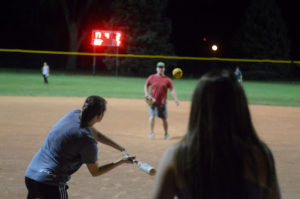Across all industries, essential personnel have been navigating their way through the COVID-19 pandemic. Evolving practices, working longer hours and taking on new responsibilities has been the norm, and, despite the quarantine and “stay at home” orders, Parks and Recreation professionals have been no different.
As we take time in July to observe Parks and Recreation Month, we recognize the challenges sports field managers at this level have been going through since the virus touched down in the United States.
“I think the trend at the Parks and Rec level is managing an everchanging environment as well as the expectation of the citizen,” said Abby McNeal, CSFM, the city wide field superintendent for the City and County of Denver Parks and Recreation. “We have been on this ever-evolving roller coaster due to COVID and increased daily users in our parks and on our trails. You get to a certain level in the organization and you have to be very forward thinking, and as a supervisor you can no longer be that forward of thinking as this is an ever-evolving climate to manage in.

McNeal and her staff oversee over 300 permittable athletic field spaces, with anywhere from 80 to 90 of those fields being used during the summer months. On Friday, July 10, their fields reopened, and now, with the pandemic in full effect they are preparing for a normal summer knowing that the user numbers will be scaled back. Fall is an unknown as well, but they are preparing for full schedule of permitted fields – roughly 268 being used per week.
Typically, the City and County of Denver Parks and Recreation will have around 300 seasonal employees. Their total this year has been reduced below 150, providing a significant reduction in services across the board. To accommodate the limited resources, fields are being mowed once per week rather than the standard three times. Other maintenance operations are also being reduced which has brought change to user and citizens’ expectations.
Guidelines produced by the state governments can be altered at any given time, which directly impacts what McNeal’s staff, and teams at other municipalities across the country, look like. McNeal stressed to the Colorado state government that safe playing conditions continue to be vital knowing that citizens will continue to go outdoors to enjoy a break from their home. This has helped keep her sports field management team intact through the summer.
“I used my industry experience, my staff’s experience, and the information that the Sports Turf Managers Association (STMA) has put out to champion keeping my athletic field seasonal staff on and not have to furlough them, or lay them off completely,” said McNeal. “I did that to justify, to sustain those fields in a safe manner and to not lose the investment we’ve made in the last six years. I wanted to make sure the improvements we’ve put in place were not taken over by weeds, and we needed to be as efficiently ready for our fields to open up for play. We kept grooming the fields and conducting weed management as well as continuous hedging and more. Those are practices we’d be doing anyway, but we definitely dug in deeper and made it our routine to do that.”
“Our number one priority is having safe playing conditions for all users, and I have stressed this with my team,” she continued. “We need to go out there and be the eyes and the ears, to be supportive, and problem solve, and be part of the solution. That is what I was championed in order to keep my staff here.”
Knowing that at any given time Mayor Michael Hancock could tighten up policies, McNeal will continue to follow instructions from Colorado’s state department of environmental health, with one of the most recent updates stating that only 25 people are allowed on each individual athletic field at one time. Further regulations have mandated all swimming pools, interactive fountains, decorative fountains and public restrooms stay closed through Labor Day.
Denver’s summer schedule will go until August 9, making it a condensed four-week stretch. The next challenge will be planning for the fall season, but with the potential for another rise in cases, and knowing the reserved game plan the city tends to follow, it will be difficult to forecast.
“One of the things they’ve asked me to look at is, with us coming online, and with the staff that we have, could we maintain a typical summer? The answer is yes,” said McNeal. “We are already adjusting our typical tasks to support full field permits in the fall.
“We are ready for the users to come and safely play on our fields.”
To learn more from Abby McNeal and more sports field managers at the Parks and Recreation level, be sure to check out the recent STMA Town Hall meeting where she, Jody Gill, and current STMA President Jimmy Simpson discuss how they are dealing with the COVID-19 pandemic.
To view the STMA’s ‘Route to Recovery’ guide and more resources, click here.
Other sports field management resources
Route to Recovery – Healing Through Sports Part I
Route to Recovery – Healing Through Sports Part II
Where Do I Start to Maintain My Athletic Fields Again?
Looking to share what you’ve experienced thus far as a sports field manager in the pandemic? Contact Nate Rubinstein at nrubinstein@buffalo.agency.


